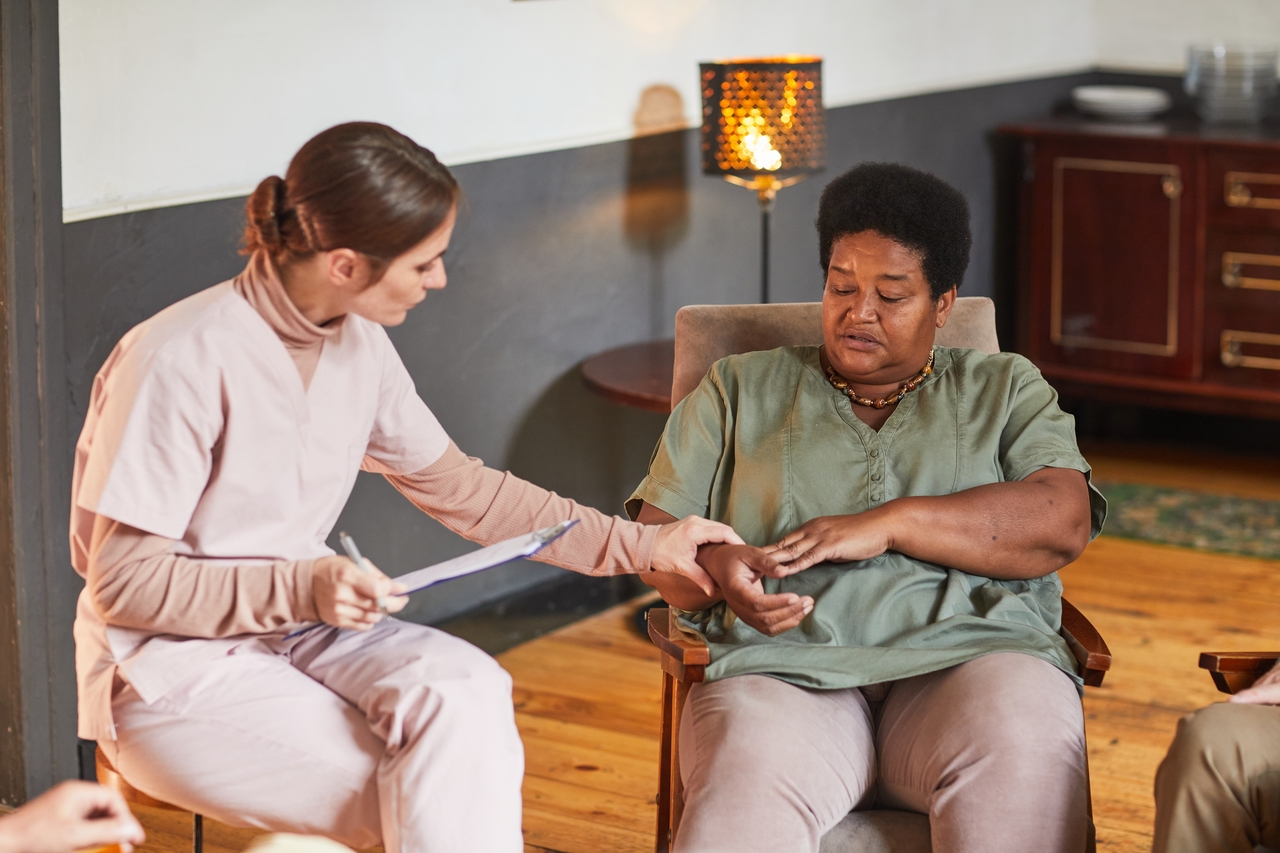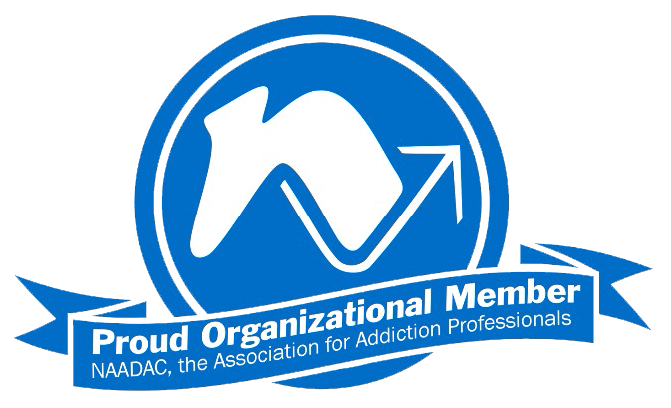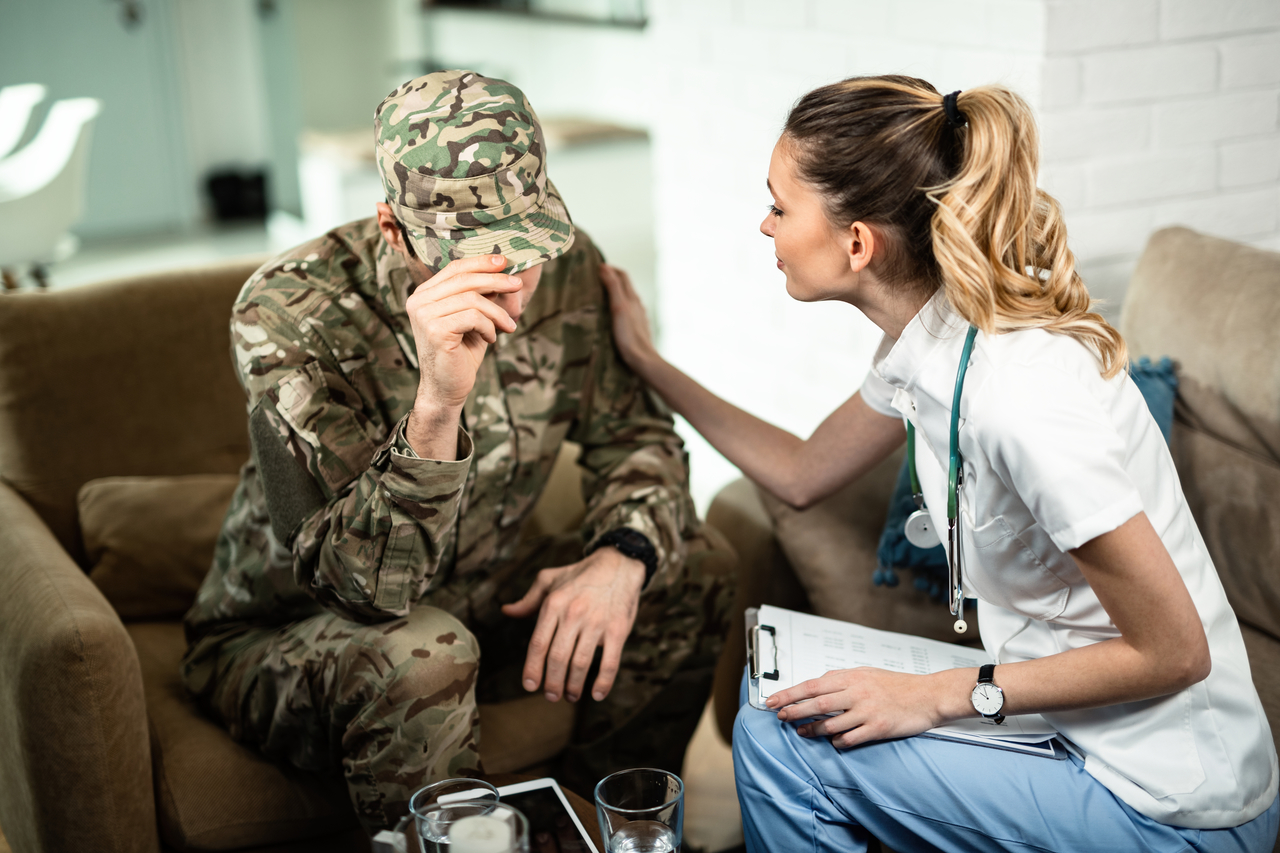-
GeneralGeneral
-
Mental Health Nursing Homepage


DISCLAIMER: This content is designed to enhance the study of nursing. This content is generic and is not designed to take into account the specific objectives, needs, and/or circumstances of any particular region or country. To become a nurse, learners must successfully complete a program of study approved by the government or state-regulatory agency in their place of residence. We cannot guarantee that the successful completion of these materials will enable you to practice in your place of residence. Make sure that you are in compliance with the scope of practice of your regulatory body before attempting to put into use or practice any of the knowledge gained.
This Mental Health Nursing course provides information and instructions on foundational concepts and principles of nursing care related to mental health problems in hospital and/or community settings. The goal is to provide a strong foundation in nursing theory, critical thinking, and clinical judgment; evidence-based practice; and safe clinical care in all settings.
The mental health nursing scope of practice varies widely depending on the country, the national and regional government, and professional regulatory agencies. In an attempt to be relevant to the entire global mental health nursing community, this course addresses nursing skills and practice on several levels. It is the nurse’s responsibility to know what particular regulations apply to their area of practice.
The Mental Health Nursing course is a competency-based course developed in partnership with Nurses International (NI) and NextGenU.org (NGU). Competencies were developed in collaboration with subject matter experts in mental health nursing education and practice. The Essentials: Core Competencies for Professional Nursing Education directs the course objectives. The course uses learning resources from accredited world-class organizations such as the World Health Organization (WHO), the U.S. National Institutes of Mental Health (NIMH), universities, international guidelines, and peer-reviewed journals. The Moodle Learning Management System (LMS) is utilized for facilitating distance learning. The course was designed by NextGenU’s Instructional Design team and Nurses International’s team members: Kathleen Capone MS, RN CNE, EdD; Teresa Darnall, DM, MSN, RN, CNE; Jordan Wilson MSN, RN-BC; Stephanie Marfurt APRN-BC, ARNP-BC; Stacen Keating Ph.D., RN; Emily Pappa MSN, RN; Bailey White RN, BSN, CCRN; Rachel Loftin, MSN, RN; Marija Bjegovich-Weidman RN, BSN, MSN, CCAP; Zahid Ullah BSN, RN, MPH; Caitlin Cartmell MFS, BSN, RN; NPD-BC; Bimala Rai BSN, RN.
There are 6 units/modules to complete, which include:
Instructions:Unit 1: Introduction to Mental Health and Mental Illness
Unit 2: Psycho-Biological Implications in Mental Health and Illness
Unit 3: Psychiatric Disorders
Unit 4: Crisis and Psychiatric Emergencies
Unit 5: Special Populations
Unit 6: Community Mental Health Nursing
The course consists of six (6) learning units. Included in the units are individual lessons with accompanying assigned reading resources, PowerPoint presentations with speaker notes, learner self-assessment, and interactive clinical judgment learning activities. A passing grade of 80% is required on quizzes and unit exams, as well as submission of the required activities for all case studies/reflection activities, to gain access to the next lesson or section.There is a 50-question multiple-choice exam at the end of the course. A grade of 80% is required. If a grade of 80% is not achieved, the learner may self-remediate and take another exam. The second exam is of comparable content, and 80% is required for a passing grade.
A certificate of completion may be downloaded upon successful completion of the course
Engaging with this Course:
Learners may take this course at no cost for personal enrichment. There are no course prerequisites.
To obtain a certificate, the learner must successfully complete:
- All the reading requirements;
- All quizzes and unit exams with a passing grade of 80%;
- All activities and case studies;
- The final exam with a minimum of 80% and a maximum of 2 attempts, and
- The self and course evaluation forms.
NextGenU.org is happy to provide your institution with:- A link to, and, a description of the course training, so they can see all its components, including the co-sponsoring universities and other professional organization co-sponsors;
- Your grade on the final exam;
- Your work products (e.g. case study activities), and any other required or optional shared materials that you produce and authorize to share with them;
- Your evaluations -- course, and self-assessments;
- A copy of your certificate of completion.
To obtain a degree:NextGenU.org co-sponsors degree programs with institutional partners. To obtain a full degree co-sponsored with NextGenU.org, registrants must be enrolled in a degree program as a student of a NextGenU.org institutional partner. If you think that your institution might be interested in offering a degree with NextGenU.org please feel free to contact us.
We hope that you will find this a rewarding learning experience, and we count on your assessment and feedback to help us improve this training for future students.
For Nurse Educators:
There are teacher resources for this course including didactic and clinical syllabi, a teacher’s guide, and suggested teaching activities.
- Nurse educators may contact info@nursesinternational.org with queries/permission to access faculty files for this course.
This course meets nationally approved standards of education developed for the addiction/substance use disorders counseling profession. This course's participants are assured that the continuing education (CE) credits provided will be accepted toward national credentialing by the NAADAC Certification Commission for Addiction Professionals (NCC AP), as well as by many of the individual state licensing/certification bodies in the addiction and other helping professions.
Subscribe to our newsletter to be notified of future updates, new courses, and to be part of our community.
Technical Support for Learners and Educators:
If you experience difficulties with technical aspects of the course or access to any course activities, please contact support@nextgenu.org for assistance. -
Unit 1 - Introduction to Mental Health and Mental Illness
 Unit Objectives:
Unit Objectives:- Determine the significance of a wellness approach to the delivery of mental health/psychiatric care to individuals and families within the context of their environment and community.
- Examine the effects of serious mental illness on daily functioning, interpersonal relationships, and quality of life.
- Interpret social and legislative influences on psychiatric/mental health care of individuals and families within the context of their environment and community.
- Determine the significance of a wellness approach to the delivery of mental health/psychiatric care to individuals and families within the context of their environment and community.
-
1.1 - Mental Wellness
Student Learning Outcomes:
- Define mental wellness as it relates to individual health, family, and community health.
- Explain the nurse's role in the promotion of mental health wellness and disease prevention.
- Identify mental health concerns as they relate to culture, barriers to treatment, and stigma.
9 URLs - Define mental wellness as it relates to individual health, family, and community health.
-
1.2 - Concept of Personality Development
Student Learning Outcomes:
- Define personality.
- Explain the theories of personality development and their relationship to nursing care (Freud, Sullivan, Object Relations).
- Discuss the role of the nurse in personality development.
7 URLs -
1.3 - Mental Illness
Student Learning Outcomes:
- Define mental illness.
- Describe mental illness disease classification according to the DSM 5 manual.
- Discuss the role of stress as it relates to mental and physical health.
- Identify risk factors for mental illness.
- Define the role of the nurse in the treatment and prevention of mental illness.
11 URLs -
1.4 - Social, Cultural & Legislative Influences on Psychiatric/Mental Health Care
Student Learning Outcomes:
- Discuss the social influences on the prevalence and management of mental health.
- Discuss the legislative influences on the management of mental health.
- Detail the global perspectives related to identification management, diagnosis, and treatment of mental health.
- Describe the nurse’s role in the advancement of mental health identification and treatment in communities.
10 URLs - Discuss the social influences on the prevalence and management of mental health.
-
1.5 - Etiology Models
Student Learning Outcomes:
- Outline the key features of the Biologic model.
- Outline the key features of the Psychodynamic model.
- Outline the key features of the Behavioral model.
- Outline the key features of the Epidemiology and age of onset model.
- Explain the relevance of the Etiology models related to nursing care.
Click here to start this lesson6 URLs -
1.6 - The Therapeutic Nurse/Client Relationship (Part 1)
Student Learning Outcomes:
- Define the therapeutic relationship, including purpose and phases.
- Explain the phases of the therapeutic nurse-client relationship.
- Compare barriers & facilitators of verbal & non-verbal communication.
5 URLs -
1.6 - Therapeutic Nurse/Client Relationship (Part 2)
Student Learning Outcomes:
- Discuss the essential communication techniques used in the nurse-patient therapeutic relationship when caring for a client with a mental health condition
- Identify the nursing factors that foster a therapeutic nurse-client relationship when caring for a client with a mental health condition.
3 URLs -
Unit 2 - Psycho-Biological Implications in Mental Health and Illness
 Unit Objectives:
Unit Objectives:- Identify the gross anatomical functions of the brain and describe their functions.
- Discuss the physiology of neurotransmission within the central nervous system.
- Describe the role of neurotransmitters in human behavior.
- Discuss the association of endocrine function in the development of psychiatric disorders.
- Discuss the integration of biological and behavioral concepts into nursing practice.
- Explore the role of psychotropic drugs in the treatment of mental illness.
-
2.1 - Biological Functions Related to Neuroanatomy
Student Learning Outcomes:
- Define the neuroanatomy and function of the central nervous system.
- Define the neuroanatomy and function of the peripheral nervous system.
- Define the neuroanatomy and function of the Neuroendocrine system and possible behavioral correlation to altered secretion.
Click here to start this lesson7 URLs -
2.2 - Functions of Major Neurotransmitters
Student Learning Outcomes:
- Summarize the role of neurotransmitters in specific regions of the brain.
- Interpret the influence of neurotransmitters on functional behavior.
- Determine the relationship of dysfunctional behavior to specific neurotransmitters.
9 URLs -
2.3 - Non-pharmacological Management Interventions (Part 1)
Student Learning Outcomes:
- Describe the non-pharmacological management therapies used in psychiatric treatment.
- Describe the indications for non-pharmacological treatments of various conditions.
- Describe the nurses role in the use of nonpharmacological treatment methods.
16 URLs -
2.3 - Non-pharmacological Management Interventions (Part 2)
Student Learning Outcomes:
- Describe the non-pharmacological management therapies used in psychiatric treatment.
- Describe the indications for non-pharmacological treatments of various conditions.
- Describe the nurses role in the use of nonpharmacological treatment methods (education, monitoring, etc).
Click here to start this lesson14 URLs -
2.4 - Psychopharmacology (Part 1)
Student Learning Outcomes:
- Identify psychotropic medications used in current practice.
- Describe the mechanism of action, indications, and contraindications of psychotropic medications.
- Describe nursing responsibilities related to psychotropic medications.
2 URLs -
2.4 - Psychopharmacology (Part 2)
Student Learning Outcomes:
- Identify the psychotropic medications.
- Describe the mechanism of action, indications, and contraindications for the classes of psychotropic medications.
- Describe the patient considerations concerning use of psychotropic medications.
- Describe the nursing responsibilities related psychotropic medications.
3 URLs -
Unit 3 - Psychiatric Disorders
 Unit Objectives:
Unit Objectives:- Discuss the behavior models that explain the etiology of mental health disorders.
- Discuss the various mental/psychiatric disorders related to clinical manifestations.
- Discuss mental/psychiatric disorders related to prognosis.
- Explore the nursing process as it applies to treatment of clients with psychiatric disorders.
- Explore the nurse’s role in patient and family education related to various mental/psychiatric disorders.
-
3.1 - Anxiety
Student Learning Outcomes:
- Describe anxiety and the etiology of anxiety.
- Outline the 4 stages of anxiety and their manifestations.
- Describe the various defense mechanism for anxiety.
- Understand the treatment and interventions for the client with anxiety.
- Describe the nurse’s role in the care of the client with anxiety.
5 URLs -
3.2 - Anxiety Related Disorders (Part 1)
Student Learning Outcomes:
- Describe the types of anxiety disorder.
- List the diagnostic criteria for anxiety disorders.
- Describe the clinical manifestations of Anxiety disorders.
- Describe the nursing implications for anxiety disorders.
7 URLs -
3.2 - Anxiety Related Disorders (Part 2)
Student Learning Outcomes:
- Describe the types of anxiety disorders.
- Understand the diagnostic criteria for anxiety disorders.
- Describe the clinical manifestations of anxiety disorders.
- Discuss the nursing implications for anxiety disorders.
6 URLs -
3.3 - Somatoform, Factitious and Dissociative Disorders
Student Learning Outcomes:
- Name the symptoms that are reported by clients with Somatoform, Factitious and Dissociative Disorders.
- Discuss the evidence-based management for Somatoform, Factitious, and Dissociative Disorders.
- Identify the appropriate nursing interventions Somatoform, Factitious and Dissociative Disorders.
4 URLs -
3.4 - Mood Disorder: Depression (Part 1)
Student Learning Outcomes:
- Define Mood Disorder.
- Identify the types of Mood disorders.
- Define Depression.
- Explain genetic, biological, psychological, & cultural factors contributing to depressive disorders.
- Examine the connection of the genetic clusters on functional behaviors related to depressive disorders.
- Explain the influence of the prefrontal lobe, hippocampus, anterior cingulate, & amygdala on the functional and dysfunctional behaviors of individuals experiencing depression.
7 URLs -
3.4 - Mood disorder: Depression (Part 2)
Student Learning Outcomes:
- Identify the symptoms that are reported by clients with depressive disorder.
- Identify the clinical manifestations of depressive disorder.
- Discuss evidence-based management of depressive disorder.
- Identify the appropriate nursing interventions for depressive disorder.
5 URLs -
3.5 - Mood Disorder: Bipolar (Part 1)
Student Learning Outcomes:
- Identify the symptoms of bipolar disorder.
- Identify the clinical manifestations associated with Bipolar Disorder.
5 URLs -
3.5 - Mood Disorder: Bipolar (Part 2)
Student Learning Outcomes:
- Discuss evidence-based management of bipolar disorder.
- Identify the appropriate nursing interventions for bipolar disorders.
2 URLs -
3.6 - Mood Disorder: Adjustment Disorder
Student Learning Outcomes:
- Define adjustment disorder.
- Identify the symptoms that are reported by clients with adjustment disorder.
- Identify the clinical manifestations of adjustment disorder.
- Discuss the evidence-based management of adjustment disorder.
- Identify the appropriate nursing interventions for client with adjustment disorder.
3 URLs -
3.7 - Schizophrenia and Other Psychotic Disorders (Part 1)
Student Learning Outcomes:
- Define Psychosis.
- Describe the various psychotic disorders.
- Identify symptoms related to psychotic disorder.
- Identify clinical manifestations of psychotic disorder.
- Discuss evidence-based management for psychotic disorder.
- Identify appropriate nursing interventions for psychotic disorder.
13 URLs -
3.7 - Schizophrenia and Other Psychotic Disorders (Part 2)
Student Learning Outcomes:
- Describe the various psychotic disorders.
- Identify symptoms related to psychotic disorder.
- Identify clinical manifestations of psychotic disorder.
- Discuss evidence-based management for psychotic disorder.
- Identify appropriate nursing interventions for psychotic disorder.
14 URLs -
3.8 - Personality Disorders
Student Learning Outcomes:
- Define personality disorder.
- Identify the symptoms of personality disorders that are reported by clients.
- Identify the clinical manifestations of personality disorders.
- Discuss the evidence-based management of personality disorders.
- Identify the appropriate nursing interventions for clients with personality disorders.
8 URLs -
3.9 - Substance Related Disorders and Addictive Behaviors
Student Learning Outcomes:
- Define substance-related disorders and addictive behaviors.
- Identify the clinical manifestations of substance-related and addictive disorders.
- Discuss the pharmacological indications for substance-related disorders and addictive disorders.
- Identify the appropriate nursing interventions for substance-related and addictive disorders.
10 URLs -
3.10 - Cognitive Disorder (Part 1)
Student Learning Outcomes:
- Define cognitive disorder.
- Describe the types of cognitive disorders.
- Identify the symptoms that are reported by clients with these disorders.
- Identify the clinical manifestations of cognitive disorders.
- Discuss evidence-based management of cognitive disorders.
- Identify the appropriate nursing interventions for cognitive disorders.
3 URLs -
3.10 - Cognitive Disorder (Part 2)
Student Learning Outcomes:
- Define cognitive disorder.
- Describe the types of cognitive disorders.
- Identify the symptoms that are reported by clients with these disorders.
- Identify the clinical manifestations of these disorders.
- Discuss evidence-based management of these disorders.
- Identify the appropriate nursing interventions for these disorders.
5 URLs -
3.11 - Disorders of Infancy, Childhood and Adolescents
Student Learning Outcomes:
- List mental disorders related to infancy, childhood, and adolescents.
- List the symptoms that are reported by clients with these disorders.
- Identify the clinical manifestations of these disorders.
- Discuss evidence-based management of these disorders.
- Identify the appropriate nursing interventions for these disorders.
8 URLs -
3.12 - Eating Disorders (Part 1)
Student Learning Outcomes:
- Define eating disorder.
- Describe types of eating disorders.
- Name the symptoms that are reported by clients with eating disorders.
- Identify the clinical manifestations of eating disorders.
- Discuss the evidence-based management of eating disorders.
- Identify the appropriate nursing interventions for eating disorders.
12 URLs -
3.12 - Eating Disorders (Part 2)
Student Learning Outcomes:
- Describe the types of eating disorders.
- Identify signs and symptoms of eating disorders.
- Identify the clinical manifestations of eating disorders.
- Discuss the evidence-based management of eating disorders.
- Identify the appropriate nursing interventions for eating disorders.
13 URLs -
3.13 - Paraphilias
Student Learning Outcomes:
- Define paraphilias.
- Name the symptoms that are reported by clients with this disorder.
- Identify the clinical manifestations of this disorder.
- Discuss the evidence-based management of this disorder.
- Identify the appropriate nursing interventions for this disorder.
3 URLs -
3.14 - Sexual Dysfunctions in Men and Women
Student Learning Outcomes:
- Define sexual dysfunctions.
- Name the symptoms that are reported by clients with these disorders.
- Identify clinical manifestations of these disorders.
- Discuss the evidence-based management of these disorders.
- Identify the appropriate nursing interventions for these disorders.
5 URLs -
3.15 Sleep Disorders
Student Learning Outcomes:
- Define sleep disorders.
- Name the symptoms that are reported by clients with this disorder.
- Identify the clinical manifestations.
- Discuss the evidence-based management.
- Identify the appropriate nursing interventions.
5 URLs -
Unit 4 - Crisis and Psychiatric Emergencies
 Unit Objectives:
Unit Objectives:- Define and differentiate the various types of crisis.
- Explore models of crisis intervention.
- Discuss nursing intervention strategies for individuals in crisis.
-
4.1 - Types of Crisis
Student Learning Outcomes:
- Define crisis.
- Explain the risk factors for crisis.
- Describe the Types of crisis.
- Identify the four phases of crisis.
6 URLs -
4.2 - Concepts of Psychiatric Emergencies
Student Learning Outcomes:
- Explain three characteristics of psychiatric emergencies.
- Identify populations vulnerable to psychiatric emergencies.
- Describe the types and management of psychiatric emergencies.
- Discuss the nurse’s role in psychiatric emergencies.
16 URLs -
4.3 - Models of Crisis Interventions
Student Learning Outcomes:
- Identify the primary, secondary, and tertiary prevention strategies for crisis.
- Identify barriers to effective intervention.
- Discuss the role of the nurse during the stages of crisis and disaster.
- Identify the demands experienced by nurses who work in crisis intervention.
7 URLs -
4.4 - Suicide Prevention and Intervention (Part 1)
Student Learning Outcomes:
- Define suicidal ideation.
- Discuss the various etiologies of suicide.
- Discuss the biological factors associated with suicide.
- Discuss the characteristics of an individual with suicidal ideation.
4 URLs -
4.4 - Suicide Prevention and Intervention (Part 2)
Student Learning Outcomes:
- Discuss the current evidence-based treatment of Suicide Ideation.
- Discuss the factors associated with the prevention of Suicide.
- Discuss the nurses role in prevention of Suicide and treatment of Suicide Ideation.
8 URLs -
4.5 - Clinical Manifestations of Anger and Violence
Student Learning Outcomes:
- Identify the predisposing factors for abusive behaviors.
- Discuss the characteristics of victims and victimizers.
- Describe the physical and psychological effects on the survivors of intimate partner (IPV), child abuse, and sexual assault.
- Discuss the concept of elder abuse, its identification, and treatment.
- Identify the nurse’s role in identification, prevention, and treatment of IPV, child abuse, and sexual assault.
14 URLs -
Unit 5 - Special Populations
 Unit Objectives:
Unit Objectives:- Explore the psychological needs related to grief and loss.
- Explore the emotional impact of aging on the psyche.
- Identify the special needs of the military family.
-
5.1 - Nurses role in Grief and Loss
Student Learning Outcomes:
- Define grief, loss, and bereavement.
- Describe types and stages of grief.
- Describe the nurse’s role in supporting clients with grief and loss.
6 URLs -
5.2 - The Psychological Needs of the Aging Population
Student Learning Outcomes:
- Discuss the theories of aging.
- Discuss the biological, social, and psychological aspects of aging.
- Explain the benefit of reminiscence therapy and life review with the elderly.
- Describe the various cultural considerations for the elderly.
- Describe the nurse’s role in supporting individual’s adaptation to the aging process.
11 URLs -
5.3 - Military Families
Student Learning Outcomes:
- Discuss the impact of deployment on military families.
- Discuss various treatment modalities for clients with traumatic brain injury.
- Discuss various treatment modalities for clients with post-traumatic stress disorder.
- Discuss the nurse’s role in education and prevention related to risks to the emotional health of military families.
9 URLs -
Unit 6 - Community Mental Health Nursing
 Unit Objectives:
Unit Objectives:- Explore the mental health needs of the community.
- Explore the prevention of mental health illness within the community.
- Discuss the treatment of the seriously ill and homeless within the community.
-
6.1 - Community Mental Health
Student Learning Outcomes:
- Describe the community mental health treatment systems.
- Discuss the primary prevention of mental illness in the community.
- Discuss the tertiary prevention of mental illness in the community.
- Describe the role of the nurse in community mental health.
15 URLs -
6.2 - Care of the Seriously Mentally Ill in the Community
Student Learning Outcomes:
- Identify the treatment alternatives for the seriously mentally ill in the community.
- Identify the treatment alternatives for the homeless in the community.
- Describe the nurse’s role in the treatment of the homeless in the community.
25 URLs -
Course and Self Evaluation & Certificate
 In this section, you can provide feedback about this course to help us make NextGenU.org better. Once evaluations are completed, you will be able to download your certificate of completion.
In this section, you can provide feedback about this course to help us make NextGenU.org better. Once evaluations are completed, you will be able to download your certificate of completion.

